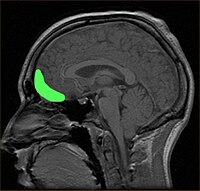
Photo from wikipedia
The maternal separation (MS) paradigm is a well-known animal model that resembles the stress of early adverse life experiences and produces structural and functional abnormalities when animals are adults. The… Click to show full abstract
The maternal separation (MS) paradigm is a well-known animal model that resembles the stress of early adverse life experiences and produces structural and functional abnormalities when animals are adults. The present study analyzed the effect of MS, in adult mice, on brain-derived neurotrophic factor (BDNF), serotonin (5-HT), and dopamine (DA) levels, and the turnover rate in the hippocampus, frontal cortex, and amygdala, and brain regions that are associated with emotion. Also, the effects of MS in depression-like responses in adult mice were studied. The results showed that MS from postnatal day 8–21 induces depression-like behaviors. In MS mice, the three brain areas showed differential responses in 5-HT, DA, and BDNF concentrations both in basal levels and when animals were challenged with an acute stressor in adulthood. Specifically, under basal conditions, MS increased monoamine and BDNF levels in the hippocampus and amygdala, but decreased these levels in the frontal cortex. In MS, but not in control mice, the amygdala responded to the stress challenge, whereas the frontal cortex showed no response. Finally, the hippocampus showed increased 5-HT and DA activity, but not increased BDNF after the stress challenge in MS mice. The present results support the theory of the hypofunctionality of the frontal cortex and hyperactivity of mesolimbic areas in depression-like conditions.
Journal Title: Behavioural Pharmacology
Year Published: 2017
Link to full text (if available)
Share on Social Media: Sign Up to like & get
recommendations!